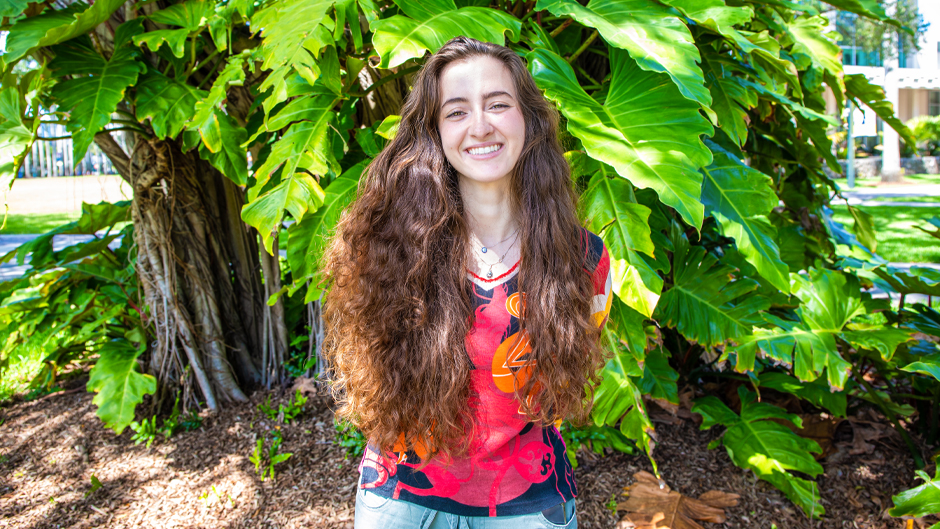Last fall, University of Miami junior Claire Fandel was huddled in the basement of the Cox Science Building studying when ocean sciences professor Will Drennan asked what she was doing for the summer.
Fandel admitted she had not thought that far ahead. But Drennan knew her potential.
He encouraged her to apply for a National Science Foundation’s Research Experiences for Undergraduates, also known as an REU.
That summer, Fandel spent three weeks aboard a research vessel in the Gulf of Mexico, documenting how its chemistry is impacted by runoff from the Mississippi River. It was part of a 10-week research experience studying with Martial Taillefert, a professor of marine geochemistry at Georgia Tech. The experience solidified her career trajectory.
“I didn’t realize then how impactful that moment would be, but it was really big,” said Fandel, a Foote Fellow who is graduating this week with double majors in marine science from the Rosenstiel School of Marine, Atmospheric, and Earth Science and another in chemistry from the College of Arts and Sciences. “That REU changed the game for me. It confirmed that oceanography is what I want to do.”
Because of the COVID-19 pandemic, hands-on research experiences were limited when Fandel started school. Yet once in-person classes started again, the commuter student continued a job she got during her first year working in the Cox Science Building as a lab assistant.
This year, she worked as a teaching assistant for a chemical oceanography lab course. And in between her classes and work, Fandel completed a senior honors thesis with Dennis Hansell, professor of ocean sciences, which required daily research. Fandel also spent about two days a week at the Marine Campus, where she and Hansell investigated how dissolved organic carbon travels northward with surface currents from the North Atlantic Ocean to the Arctic Ocean.
“I was able to put my physical oceanography skills together with what I learned in biogeochemistry to understand an entire ocean system,” she said, referring to the Arctic. “It sparked an interest in how important this body of water is and how unique it is from a chemistry standpoint.”
Hansell said he was impressed by Fandel’s interest and endurance to delve into such a complex project. For about three decades, Hansell has been studying the carbon cycle of the world’s oceans, which soak up 25 percent of the billions of tons of carbon dioxide added to the atmosphere by the burning of fossil fuels. But he pointed out that there are still many questions about how the process of carbon sequestration happens in the deep ocean. Hansell asked Fandel to focus on the Arctic Ocean because it is known for the highest concentrations of dissolved organic carbon.
“Claire was very unique in not being intimidated by the large scale of the system that she had to understand,” Hansell said. “We were looking at lots of datasets from the Arctic Ocean, and we had to map them out to understand the circulation. It was fun because it became a collaboration where I guided her, but she did the work.”
Fandel had an inkling that she wanted to study marine sciences well before college. As a child, she spent summers visiting her grandmother in Monterey, California, and was intrigued by the tide pools full of marine life along the Pacific Coast, coupled with the interesting marine geography of being so close to the San Andreas Fault. The Miami native went on to study at MAST Academy in Miami for high school; and during that time, she spent two days a week volunteering in marine biology and ecology professor Chris Langdon’s lab at the Rosenstiel School.
Her positive experiences encouraged Fandel to apply to doctoral programs in ocean sciences. Strong grades gave her a choice between a few schools. Ultimately, she chose Rosenstiel because of its breadth of ocean scientists and the school’s cooperative nature.
“Rosenstiel has a ton of oceanographers, and I realize there are a lot of opportunities to collaborate with others and get their opinions, which I really liked,” she noted.
This fall, Fandel will start studying for her Ph.D. with Kim Popendorf, an assistant professor of ocean sciences, who specializes in studying marine microbes. She hopes to join Popendorf on a research cruise in the Pacific Ocean next summer; but overall, Fandel is just excited to uncover more about the ocean.
“Ocean chemistry is an essential portion of our understanding of the earth, because it affects all living things and our atmosphere,” she said. “In graduate school, I’m really looking forward to finding more research questions. Because I’ve realized that the more you know, the more you don’t know, which is the exciting part because there is always more to look at in the ocean.”

